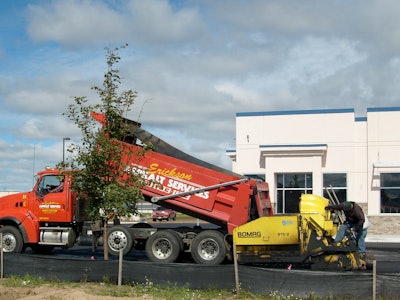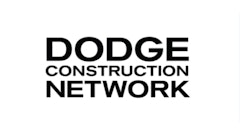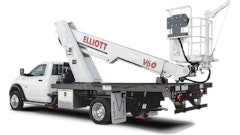
Don’t ever tell Dan Erickson and his brother, Brian, that a consultant can’t have a huge impact on a business. In the case of Erickson Asphalt Services, Princeton, MN, a consultant saved their business – and he saved it on the same day the two brothers were going to call it quits.
Since then the paving and pavement maintenance company, which relies on residential driveways for 90% of its work, has undergone a major shift in focus and has survived the recession, actually coming out stronger.
“2013 has been an unbelievable year,” says Dan Erickson, president. “Through mid-August we’ve already surpassed 2012 season numbers -- sealcoating is up 62% over 2012 and paving up 47% -- and it looks like we ought to come close to our record year overall. Gross sales-wise we’re going to be within $100,000 of our record year, and profit-wise, which means the most to me, we’re way ahead of our record; that’s just the way it’s lining up.”
Erickson, who co-owns the company with Brian, the production manager, says the company provides sealcoating, paving and pavement maintenance services the north metro area of Minneapolis/St. Paul. He says the 16-person company does 90% of its work on residential driveways and 10% on small commercial lots. Erickson Asphalt runs two sealcoating crews, one paving prep (grading) crew, and one paving crew completing 400 sealcoating jobs and 300 paving jobs annually. Most of the work is on existing driveways, either maintenance work or often extending a paved driveway to another part of a property.
“We live in a rural area where most of the people live on 2 ½-acre lots, so there’s a lot of room and many people will add a third garage or a pole building -- or maybe they only paved part of the long driveway when they bought the house so a lot of our work is new extensions of existing driveways, in addition to reconstruction driveways, overlays and sealcoating and maintenance.”
That’s a major shift from the 450 new construction driveways the company built prior to the recession – but that’s getting ahead of the story.
An unusual start, then restart
Erickson Asphalt Services had an unusual and unusually rocky start – and then a restart. The Ericksons’ father and uncle owned a paving business specializing in building new driveways, and the father and uncle encouraged the brothers to start their own sealcoating company to sealcoat the driveways the paving company built. The two started Country Cousins when Dan and his brother were 14 and 15 respectively, it last only a year, but Dan Erickson saw the appeal.
In the winter of 1979-1980 Dan Erickson went to a SealMaster event in St. Louis and came back fired up. He bought a 550-gal. sealcoating tank, blower, and hand tools, then, because he wasn’t old enough to drive, convinced his mother to drive him around so he could go door to door knocking for work (adding to the referrals from my dad and uncle’s paving business).
“The next year I had enough work where I had to hire two people, and they both had to be old enough to drive me around because I still couldn’t drive,” he says. By the end of 1981 he had made $30,000 -- heady stuff of a 16-year old high school kid -- and he enjoyed the money, buying gas for friends’ cars and paying bills for friends and actually owning three cars of his own before he was old enough to have a license. “That was lots of fun,” he says.
But not for too long. The winter following his second sealcoating season came and he’d spent every dime he’d earned. “My parents let the bank just come and get the equipment because I didn’t have the money to make the payments during the off season. They let me fail,” he says. “They just let me make my own financial decisions and let me fail and at the time it was humiliating because I’d been a big shot in high school and I enjoyed that. But that winter I learned probably the best lesson I ever learned.”
From 1982-1990 he and Brian worked for other contractors, learning the business and the trade and in 1990 started Erickson Asphalt with a $100 investment -- $50 from each brother. They fixed up a Layton box paver they’d bought at auction and started paving. When they’d need a roller they got one from a dealer on demonstration, then returned it unbought. Erickson says that first year they did only a few dozen jobs; the second year they did five times as many, “and it kept going from there.”
“But I never forgot that lesson I learned, about not planning for the downtime,” he says.
Enter the Consultant
Erickson says the business flattened out by 2000 and the brothers didn’t know what to do. “We were at an impasse on how to move forward and frankly we weren’t getting along at all. And one day we were sitting in the shop trying to decide whether we should even go on with the business when at literally that exact moment a consultant walked through the door asking if we needed any help with the business.
“He literally was walking door to door to drum up some business and he walked in wearing a suit and tie and it was kind of a somber moment he walked into,” Erickson says. “He didn’t know what he walked into but he learned real quick and he said ‘I can really help you guys out’ and he did.”
Erickson says the consultant, who has since died, reorganized their entire operation, putting in place processes and procedures, “and within the next two years we quadrupled our business. ‘Supernatural timing’ is what I like to say it was because it helped us get organized right before the start of that boom.”
Would history repeat?
He says the company rode the boom well following the advice of the consultant and taking full advantage of the hot economy. But Erickson had been around the industry a long time and saw some warning signs.
That’s because during the 1980s recession his father and uncle went out of business when they didn’t get paid by a lot of the builders they’d done work for. “I watched all that happen and I listened to all the conversation going on around me,” he says. “It made an impact.”
By 2005 as the next recession was taking hold he looked at the company’s books and realized Erickson Asphalt Services had built roughly 450 new driveways and was owed $300,000 by builders.
“That sounded familiar to me so I contacted all the builders we’d worked for and told them the bills were net 10 days… and more than half of the more than 40 builders I worked for fired me immediately,” he says. “It took until 2007 but by the time the downturn hit I had collected all but $30,000 of that money.”
He says he knew the work he lost would go to his competition, and they did take up that slack, but he says nine competitors went out of business. “It was a very tough move and I second-guessed it a lot but it saved our butts.”
At about the same time Erickson and his brother decided they needed to get lean, so they sold their dump trucks and got down to virtually zero debt. “That really helped get us through the downturn and that’s a direct result of the bank taking my equipment when I was 16.”
Erickson says the company was hit hard by the recession, hitting rock bottom in 2008-2009 when the company went from completing 450 new construction jobs down to eight.
Thriving out of recession
While in the grips of a recession economy they reexamined the company and made several key changes that helped create last year’s success.
First, in 2009 they moved heavily into pavement maintenance and away from new construction, going from one part-time crew to two full-time crews.
Second, they decided to track everything they did. “When we were busy we didn’t do that. We were working too hard to get done all the work we had,” Erickson says. “During the boom it seemed like the money was just falling out of our pockets. There was so much work that we didn’t pay that close attention to those things.”
Among other specifics Erickson now tracks its production rates on different types of soil and on different types of jobs. “Now we have a better price system,” he says. “On tear-outs we actually came down in price because we learned that actually took less time as opposed to new installs where we have to excavate in clay and sand.”
Details are itemized on every job including crew hours and material usage. That information is used to calculate job costs, and that enabled Erickson to start analyzing which jobs are bringing in the greatest margins. “Then we really started going after those jobs, and the ones that were costing us money -- we let our competition take those.”
“The biggest thing we found out is that if you took jobs that take less time to do you can do more of them with a smaller crew, so those jobs can be more valuable to us,” Erickson says. “If we can do 1 ½ jobs in the same time it takes to do one job we can be 50% ahead of the game.”
“We came out of the recession pretty lean,” Erickson says. “We had to really sit down and look at where we’re wasting anything, what inefficiencies there were and what things actually made us the most money. We upped our minimum prices for jobs, and one result of that was we eliminated some of the smaller jobs that were less profitable. My competition can have those.”
Developing a Database
The tracking provided Erickson Asphalt Services with important information about every customer, so Erickson decided to put that information to work. Erickson Asphalt has a large customer base going back years but all the files were paper in boxes.
“We decided to really key on our past customers because there’s a greater return on that work and it costs us less to get it,” he says.
So the question became: How to reach those people? And Erickson answered the question by creating its own Customer Management System in Excel, which became fully operational last spring.
“It helps us manage and market to all our customers and we have records that go back as far as 1996,” he says. “Information in the records includes, among other things, every driveway the company’s ever done, the date it was done, and the price and the square footage of the driveway. Every time Erickson Asphalt sealcoats or paves, the data gets entered into the system.”
He says that in years past the contractor would send out about 2400 direct-mail pieces “because it’s daunting to work through 13,000 customers by hand to put that list and bids together. But with the database we can go through quickly and better and target the areas we want. And it’s easy to remove the people we sealcoated for last year who we know aren’t going to need sealcoating this year.” Erickson says the company even tracks the age of the driveways when it can “because we don’t want to send a sealcoating letter with a discount to people that have a 30-year-old driveway.”
He says past by-hand marketing efforts resulted in roughly 70 customers to start the year. “This year we had 280 to start the year and part of that we can attribute to the new database system but also some to the economy turning around.”
But possibly more important than the number of jobs the new database marketing brought in is the value of those jobs. He says that on work obtained through means other than the direct-mail campaign the company is getting about 12 cents per square foot for sealcoating a driveway. But work brought in through the direct-mail effort is averaging 18 cents per square foot.
Currently the database contains 13,000 past customers, and in spring 2013 Erickson Asphalt used the system to send direct-mail promotions to 8,000 targeted customers in the database. The direct-mail piece was a sales pitch for sealcoating and included in the same envelope was a coupon for any paving they might need done.
How effective is the targeted data-based approach? Very. Erickson mailed an early “Happy Easter” marketing piece -- the only direct-mail marketing they did all year. “And we were overwhelmed with work so we didn’t mail out anymore. I’ve got all kinds of ideas to use it but we just didn’t need them,” he says.
“You eliminate your competition when you send them a direct-mail piece like we did,” he says. “The price to get their driveway sealcoated is included in the direct-mail piece and there’s a savings if they prepay. Some people don’t feel comfortable with that and that’s fine. We just ask them for prepayment and reward them if they do. That gave us $130,000 prepaid to start the year.”
Erickson says that one mailing cost $8000 and as a direct result the jobs the company had in the pipeline before the season started totaled $300,000 worth of work.
“Through tracking we found out our close ratio on those customers was almost 60% as opposed to about 30% on any other type of advertising,” he says. “We finally caught up in mid-August.”
Among the changes that came out of the recession is a reevaluation of Erickson Asphalt Services crew size. Years ago the paving crew had a foreman, for example, but Brian Erickson has taken on that role.
“We all started wearing a few more hats,” Erickson says. “We had three salespeople during the boom and we cut back to just me, and this year we added one back. Everybody here wears more than one hat. We used to have guys who just graded before the paving crew showed up but now the grading crew can double on the paving crew, so depth-wise we’re in better shape.”
Erickson also sold two of its seven haul trucks and used the money to pay off some debt and enabling them to save money on running the trucks and insurance. “We’re just a little leaner, and now on big jobs we’ll just hire extra trucks if we need them,” he says.
Erickson says the company has also begun stockpiling materials that can eventually be recycled into base material in future projects.
“We tear it out and haul it back to our yard and every so often when the pile gets large we hire someone to come in and crush it for us so we can use it as base material,” he says. “In the past we’d drop the material off at someone else’s yard and we’d often pay to drop it off; now we’re getting a better base product for our customers and it’s cut our base material cost about in half.”















